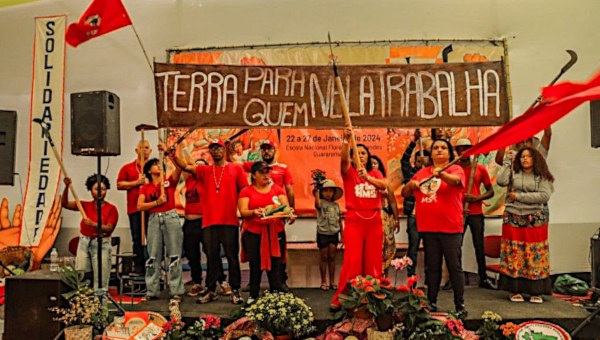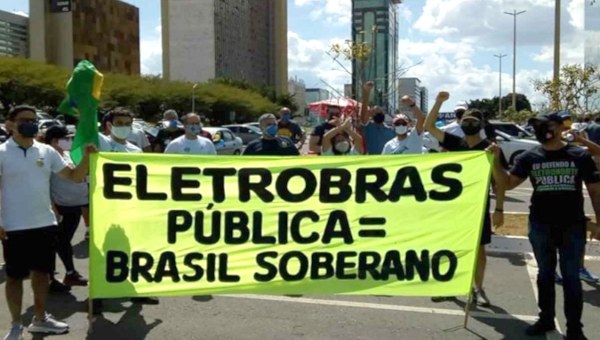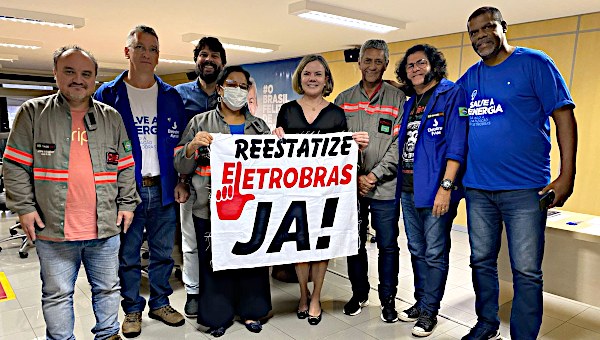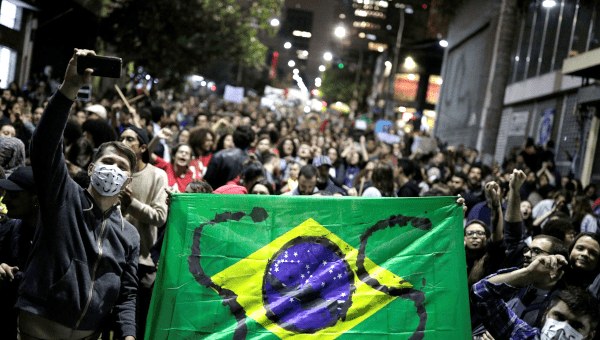Brazil: Between Pandemic Incompetence, Institutional War and Growing Polarization
Three critical issues recently infused themselves on Brazilian politics. First, a parliamentary commission by the Brazilian Senate to investigate the government’s handling of the pandemic is in the process of uncovering a vast network of corruption linked to the purchase of vaccines with the, at least, indirect involvement of president Jair Bolsonaro.
Next, Bolsonaro’s popularity is clearly on a downward path, and former president Luiz Lula da Silva consistently leads all polls with at least a 20 per cent margin against Bolsonaro.
Finally, since the end of May, mass protests against Bolsonaro in all 26 state capitals and more than 100 additional cities have become a regular occurrence with three major mobilizations having so far occurred, each of which involved around 500,000 protesters.
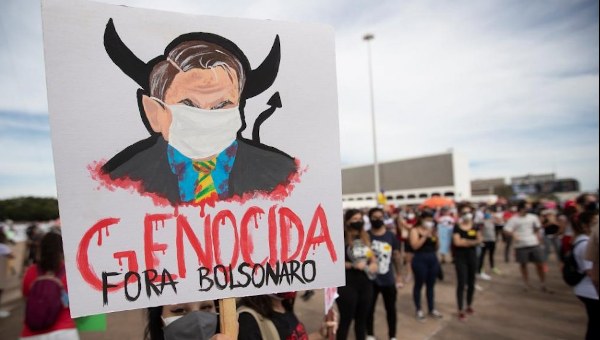
Vaccine Procurement and Corruption
The parliamentary commission of the Senate was installed on 13 April, 2021. One of the essential issues uncovered early on was that the federal government ignored 81 emails from vaccine maker Pfizer who had been offering large quantities of its vaccine ready for late 2020, for the price of $10 (US) per dose. Yet a contract with Pfizer had only been signed in March 2021, fully 8 months after the first email from Pfizer to the federal government.
In mid-June 2021 Ricardo Miranda, a public servant at the Ministry of Health and head of logistics for the purchase of vaccines, reported to the commission that there had been an unusual amount of pressure from his superiors to buy the vaccine Covaxin from the Indian company Bharat Biotech.
The most alarming issue was that the price for this vaccine was set extraordinarily high at $15 (US) per dose, higher than any other vaccine yet bought by the Brazilian government. Furthermore, the purchase was to be run through a third company called Precisa, which had been linked to cases of fraud in years past. This raised suspicions of overpricing. The Brazilian embassy in New Delhi informed via diplomatic cable in August 2020 that the price for a dose of Covaxin would be $1.34 (US), ten times less than the price in the contract eventually agreed to by the Brazilian government.
Nevertheless, in June 2021, with the purchase agreed to and money set aside specifically for this purpose, the transaction had yet to take place. A few days after the revelations emerged, the government canceled the contract. The scandal broke when Miranda reported that he had told his brother, Luis Miranda, about the unusual purchase.
Luis Miranda is a member of parliament belonging to the political party the Democrats, and Miranda used to support the Bolsonaro government. The Miranda brothers then met in person with Bolsonaro in late March 2021, telling him about the irregularities. In their conversation, Bolsonaro apparently mentioned a connection the deal had with Ricardo Barros, a member of the Progressistas party and the leader of the government in Congress. Bolsonaro promised the Miranda brothers to hand over this information to the federal police, but it never happened.
Military Meddling and Malfeasance
Up to the time of writing, about a month after the scandal broke, Bolsonaro has not responded clearly to the allegations by the Miranda brothers. When, in early July, the president of the parliamentary commission, Omar Aziz from the centre-right Social Democratic Party (PSD), mentioned that a large number of military officials seem to be involved in this and other corruption scandals involving the purchase of vaccines, and after further calling this loose group the “rotten side of the military,” Aziz received a sharp rebuke from the Minister of Defence Walter Braga Netto and the three top army commanders, who threatened him with consequences in an official statement.
Braga Netto, an army general without party membership, is one of Bolsonaro’s closest allies, and some commentators regard him as the most powerful person in the Bolsonaro government. The joint statement by the defence minister and the army commanders was a case of unusual meddling by the military into political debates and was viewed with alarm by a wide range of politicians.
In the first week of July, rumours that the Miranda brothers were in possession of a recording of their conversation with Bolsonaro were confirmed by members of parliament. Understandably, the Brazilian public is now anxious to know about the precise content of the conversation.
The statement by Aziz regarding the “rotten side” of the military was also based on the fact that the negotiations for vaccines were led by Colonel Elcio Franco, the number two at the Ministry of Health until March 2021. There are indications that he funneled about R$110-million (reals), which was destined for the purchase of vaccines, to the armed forces in order to buy fuel and spare parts for aircraft.
Franco claims that he was making sure the army could provide logistics for the distribution of vaccines and thereby organized the maintenance of its aircraft. It is these suspicions which directly link the army to corruption that explain the harsh response by the military to the comment by Aziz.
Bolsonaro himself let the public know that he doesn’t “give a shit” about the parliamentary commission and observers commented that he is obviously getting nervous, even by his standards. Bolsonaro added that he would not reply to a commission headed by “three gangsters.”
One of these three, Renan Calheiros, a traditional heavyweight from the conservative Brazilian Democratic Movement party (MDB), responded in the same manner on 10 July, saying: “I am not a specialist in anatomics, but I think someone has to investigate if after the knife attack against Bolsonaro [in 2018] they did not connect his intestines directly to his throat. Only this could explain his fecal language.” One sees clearly in these remarks the hostility now present in the relations between the center-right and extreme-right.
Bolsonaro Plans to Trump the Elections
In parallel to these developments around corruption, Bolsonaro repeated and reinforced his claims that he would only recognise the result of the next presidential elections if the country returns to printed ballots, and that elections might not take place at all if the use of electronic voting machines is maintained.
He repeated frequently that Lula, whom he also likes to call the “nine-fingered one” – referring to a missing finger that Lula lost in an industrial accident – could only win the elections through fraud.
Due to historical and widespread electoral fraud Brazil adopted an electronic voting system in 1995 which is recognised as one of the most secure voting systems in the world. The system is not online and therefore cannot be hacked. The Supreme Court has only recently confirmed that printed votes are unconstitutional. A small electoral reform that passed in 2015 contained a clause that all votes from the electronic system should be printed out, and that all voters should check if this printout represents who they voted for, before the final results are announced.
Federal state attorney Raquel Dodge initiated a motion in 2018 to declare this change unconstitutional since it would breach the secrecy of the vote, as it would allow to identify how people voted. On 14 September, 2020, the Supreme Court confirmed Dodge’s motion. The head of the Superior Court of the Electoral System, Luis Roberto Barroso, warned Bolsonaro that it is a crime to impede elections. Bolsonaro responded by calling Barroso an “idiot” and a supporter of pedophilia.
Eight leading parties from the centre-right in the meantime issued a statement in favour of the electronic voting system, among them the Democrats, the PSDB, the MDB, Solidariedade and the Green Party.
With his statements regarding elections, Bolsonaro is already mobilizing forces for a Trump-style attack on democratic institutions. The president of the Senate Rodrigo Pacheco from the Democrats, and also Arthur Lira from the Progressistas, the president of the Congress, clearly condemned the attacks by Bolsonaro on the electoral system.
Battles In and Among State Institutions
On 12 July, Bolsonaro’s vice president, General Hamilton Mourão, declared that elections will take place in 2022 in any case. Mourão, himself a fan of the military dictatorship, is seen to speak for an important current in the army which is neither progressive nor democratic, but which also does not have any pretensions of changing the prevailing democratic order. A similar statement came from General Santos Cruz, who served as minister for Bolsonaro for some time.
The institutional polarization between parts of the military and sections of Congress, and between the government and the Supreme and Electoral Court is much to the liking of Bolsonaro who still aims for a rupture with the democratic system, with the military then taking a special position and the Executive enjoying ample rights without checks and balances.
The crucial question is whether Bolsonaro can still mobilize enough support for this confrontational course. Support for his government is currently at 25 per cent, and rejection at around 52 per cent, slightly weaker compared with the 30 per cent in support of Bolsonaro in May 2020 when he tried to mobilize openly against the democratic system for the first time.
Financial and industrial capital largely rally behind a third centre-right option beyond Lula and Bolsonaro. On the other hand, most of agribusiness and about half of evangelicals stand behind the president, as do most of the 500,000 officers of the military police. The majority of ordinary Brazilians polled would support Lula in the next elections, I will come to those numbers later.
Sustained Street Protests and Left Realignments
The successful turnouts for mass demonstrations occurring since May 2021 surprised the presumptive leftwing candidate Lula who was skeptical if these would draw sufficient numbers of people. Indeed, the leadership of the Workers’ Party (Partido dos Trabalhadores, PT) was not keen to call for more protests due to the pandemic. But the protest movement created its own dynamic. If anything, participation in the demonstrations became broader in profile in the meantime, and a fourth day of protest is planned for the second half of July.
Debates among trade unions have started about how to integrate the organized working class more firmly into the movement, and early August is seen as a possible date for a general strike. The four central demands of protesters are focused on vaccines, food on the table, a revival of the emergency basic income of R$600 that had been paid throughout most of 2020, and the impeachment of Bolsonaro.
On the left side of the spectrum of political parties, there have been some regroupings due to a provisional alliance between Lula and the Brazilian Socialist Party (PSB), a traditional center-left party. While the party supported Lula’s earlier governments, it supported the rightwing candidate Aecio Neves in the second round of elections against the PT’s candidate Dilma Rousseff in 2014, and voted for her impeachment in 2016.
Sections of the party, mostly in the south of Brazil, are staunchly rightwing, while its traditional strongholds in the Northeast are rather socialdemocratic. The provisional alliance between the PT and PSB led to two important leftwing candidates changing their party affiliations from parties who are to the left of the PT to the rather moderate PSB. Marcelo Freixo had been a member of the Socialism and Liberty Party (PSOL) – a leftwing split from the PT – for 16 years but left the party on 11 June to move to the PSB. He will run as a joint-leftwing candidate for the elections in the state of Rio de Janeiro in 2022 where he is leading the polls by a wide margin.
A similar alliance did not (yet) take shape in the state of São Paulo, where Fernando Haddad from the PT could run against Guilherme Boulos from the PSOL for the state-level elections next year. A joint-left candidate in the state of São Paulo would also probably win the state governorship which would be of extreme importance due to the significance of the most populous and most wealthy state in Brazil. If Haddad and Boulos run against each other, this will pave the way for another rightwing state governor.
The second change in party membership was undertaken by Flávio Dino, state governor of Northeastern Maranhão, currently in his second mandate. The 53-year-old Dino gave up membership in the Communist Party of Brazil (PCdoB), after 15 years on 16 June 2021, and also joined the PSB. The entry into the party by Freixo and Dino aims at the transformation of the PSB into a center-left party that could serve as a stable ally for the PT but would also be able to attract more conservative voters who are hesitant to vote for the PT.
This development clearly weakens party formations to the left of the PT, the PSOL and PCdoB, especially with two of their political heavyweights leaving – but these two parties usually get only very small vote shares in national elections. Another well known politician from PSOL, Jean Wyllys, who resigned from Congress due to death threats, left the party in May 2021 and joined the PT. Wyllys framed his change of party as a response to the decision by the PSOL to run its own candidate for the elections in 2022, instead of supporting Lula.
The Center Right against Bolsonaro
The center-right, embodied by various party vehicles run by the traditional elites of Brazil, sets its hopes on the decline of Bolsonaro’s popularity and aims to get its own candidate into the second round of the presidential elections to beat Lula.
While this political current, which was trashed in the 2018 elections, can not yet agree on a candidate, one of its hopefuls, Sergio Leite from the PSDB and governor of the Southern state Santa Catarina, made a decisive move that might place him in a good position to run for the third option: he officially came out as gay on 1 July which could position him well with younger voters.
Whether the third option of the centre-right will be successful in removing Bolsonaro from the race in the first round of the elections, will depend much on the candidate this current chooses and his popular appeal – there are no female candidates in the debate up to now.
Bolsonaro Pivots to Tax and Spend
Meanwhile the largest problem for Bolsonaro is that he does not have a positive project. The only area where he could score points will be in the economic sphere where two projects are in the pipeline that could serve to restore some of his popularity.
The first project is to expand the number of recipients of the social transfer program known as the Bolsa Familia from 15 to 17 million recipients, as well as the amount which would increase from R$200 to R$300 per month, if everything goes as planned. Bolsonaro also wants to rename the program which is strongly associated with Lula. If this plan goes through, and it is highly unclear it will, it is one of the few chances left for the current president to get back on route to re-election.
The second project entails tax reform. The plan, designed by the tax office, and approved by the neoliberal Minister of the Economy, Paulo Guedes, is to lower taxes for companies, as well as for workers. Yet in order not to subsequently increase government debt, taxes on dividends and profits from stock options, which were abolished in the mid-1990s, shall be reintroduced. The idea is to first raise the threshold for wages that are exempt from taxes from R$1900 to R$2500 per month, which would add about 5 million workers to this group, but also to significantly lower taxes for all workers in a progressive manner, which would reduce the tax burden of 31 million workers. Another idea is to lower the taxes for companies from 34 to 21 per cent. The idea of the whole package is that it should not lower or increase the tax income of the state.
Unsurprisingly, there is considerable resistance from financial capital against the proposal to tax dividends, which might be diluted or removed altogether. Even Chicago school adherents like Guedes commented that rich people in Brazil should be ashamed at not paying taxes. He emphasised that 20,000 Brazilians earn about R$360-billion in dividends per year, in other words 0.01 per cent of the population pay an average of 1.8 per cent. In this way, a worker who earns R$4700 per month and pays 27.5 per cent in taxes pays more than the co-owner of a company who earns R$350,000 per month. Guedes wants to set the taxes on dividends at 20 per cent.
Popular Support for Democracy
Thus, success on the economic front for Bolsonaro is a highly insecure bet. What remains is a bet on some type of a coup, and for this the attitude of the military will be decisive. There have been various instances when threats by figures seen as being close to the military had influence on decisions by the judiciary. This was most visible in the summer of 2020 when there were plans to seize Bolsonaro’s mobile phone in connection with investigations against him. General Augusto Heleno, head of the General Office of Intelligence, warned about the possible consequences for “national stability” of such a move.
Bolsonaro’s phone was never seized in the wake of Heleno´s statement. In this way, the investigations of military personnel involved with the government’s purchase of vaccines will be a test case for the military´s adherence to the rule-of-law, in the event that the law turns against some of its members.
Many analysts on the left and also in the liberal mainstream believe plans for a coup are already underway by Bolsonaro and parts of the military, but in any case this will be quite risky if popular sentiment remains like it is today.
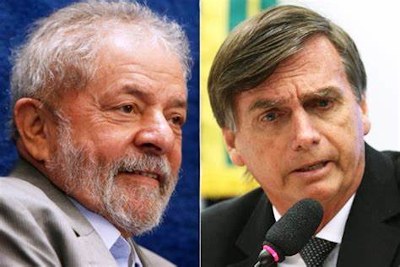
The latest polls from early July 2021, indicate that 63 per cent of the population think Bolsonaro is incapable of leading the country. 58 per cent think that military members should not have posts in the government, while 38 per cent think they should be able to hold such posts.
An election poll from the Datafolha institute from 9 July shows that 46 per cent would vote for Lula in the first round of presidential elections, and 25 per cent for Bolsonaro. In the second round, Lula would receive 58 per cent of the votes, and Bolsonaro 31 per cent. 59 per cent of voters would not vote for Bolsonaro in any circumstance, and this goes for 37 per cent of voters in the case of Lula.
The social and economic profile of voters is quite clear. More support for Lula than in the general population is found among the following groups: people who earn up to the equivalent of two times the minimum wage per month, who have only a basic education, are Catholic, live in the Northeast, are black or brown-skinned, and who are unemployed or looking for work. A majority for Bolsonaro against Lula is only present among entrepreneurs (52 versus 25 per cent), the middle classes which earn between 5 and 10 times the minimum wage per month (41 versus 21 per cent), and the rich who earn more than 10 times the minimum wage per month (36 versus 22 per cent).
Thus, any attempt at a coup or a blockage of the elections scheduled for October 2022, as determined by the Brazilian constitution, would have to confront a popular majority. The military has already lost much prestige through its close relationship with the Bolsonaro government and any attempt at a rupture with the democratic order would most probably increase this process. A recent interview in Valor Econômico, the Brazilian financial newspaper, with one of the most influential liberal Brazilian economists, Arminio Fraga, provided interesting insight into the power relations behind a coup attempt.
Fraga, who headed the central bank from 1999 to 2003, confirms that Bolsonaro is a real threat to democracy but does not think the military would support a coup. Fraga speaks in favour of an impeachment of Bolsonaro, and he emphasized that capital will adapt to a new Lula presidency, while the third option of a center-right candidate gaining presidential office remains a viable option. Journalist Luis Nassif adds in another comment the insight that though the middle classes wholeheartedly supported a coup in 1964, in 2021 this is not the case.
Challenges for a Lula Redux
The popular masses support a Lula candidacy not only because of the more predictable nature of Lula`s politics, but also because of the hope to return to better days on the economic and social fronts. Apart from the idea to ameliorate the situation of the poor majority with less taxes and higher cash transfers, the Bolsonaro government does not have any economic or industrial policy that could lead to an increase in employment and wages.
Currently, 14 per cent of Brazilians are officially unemployed, 10 per cent of the population are going hungry and about half are in a situation of food insecurity, in other words half of the population does not have enough to eat from time to time.
Informal employment is the reality for about half of the population and steep inflation in basic goods like gas for cooking, beans, rice, meat and cooking oil meet with falling wages – in other words, poverty is increasing rapidly. The economic policy of the Bolsonaro government until now is mostly focused on building new infrastructure for the growing volume of agribusiness exports – one of the chief reasons for spiralling food inflation inside Brazil. Indeed, the very “success” of the Brazilian agribusiness export model, which transformed the country into the world’s largest producer of food, has come at the cost of widespread hunger at home.
The pandemic, the handling of which represents the biggest failure of the Bolsonaro administration, has receded somewhat, but numbers are still high with an average of 1300 deaths per day. This scenario might change in August when the Delta variant will have spread in Brazil and numbers will probably go up again. Although the vaccination drive is finally picking up, until now only 15 per cent of the 210 million strong population has received a complete vaccination, and the number of covid-related deaths approaches 550,000.
Apart from agribusiness, petrochemicals and mining, Brazil does not hold a leading position in any advanced industry – with the exception of flexible engines for cars that can switch between biodiesel and gasoline, in which Volkswagen is planning a major new investment. The long term trend toward deindustrialization, started already in the late 1980s, was not halted by the successive centre-left governments under presidents Lula and Dilma Rousseff.
The super commodities cycle of the 2000s reinforced dependence on demand for raw materials from China, which is now Brazil’s largest trading partner. Brazil is the biggest producer of iron ore and soy in the world, but has few processing capacities. In other words, the real conflicts over the development path of the country will only start with a new government after Bolsonaro. Nevertheless, these conflicts can at least be fought and different options can be debated in society.
Given the overall economic situation, and the difficult position of Brazil in the world market, a new Lula government will have even less space for manoeuvre than his previous administrations had between 2003 and 2010. It will also have to confront a refashioned extreme-right with some capacity for street mobilization.
Lula has already let the military know via an intermediary, a former minister of defence, that he would not take any revenge measures against military commanders for their allegiance to Bolsonaro in case he prevails in 2022. This speaks volumes in terms of the potential relations of force between the armed forces and a new Lula government. •


